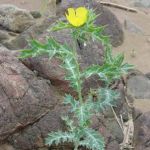| Common Name: |
Mexican Poppy |
| Other Names: |
Cardo, Cardosanto, Flowering Thistle, Mexican Prickly Poppy, Prickly Poppy, Thistle Poppy |
| Botanical Name: |
Argemone mexicana |
| Genus: |
Argemone |
| Family: |
Papaveraceae |
| Native Location: |
Mexico, widely naturalized worldwide. |
| Parts Used: |
Seeds |
| Chemical Constituents: |
A. mexicana seeds contain 22-36% of a pale yellow non-edible oil, called argemone oil or katkar oil, which contains the toxic alkaloids sanguinarine and dihydrosanguinarine. Four quaternary isoquinoline alkaloids,dehydrocorydalmine, jatrorrhizine, columbamine, and oxyberberine, have been isolated from the whole plant of Argemone mexicana.
The seed pods secrete a pale yellow latex when cut open. This argemone resin contains berberine and protopine
Berberine
Dihydrosanguinarine
Protopine
Sanguinarine
|
| Traditional Medicine: |
The Seri of Sonora, Mexico use the entire plant both fresh and dried. An infusion is made to relieve kidney pain, to help expel a torn placenta, and in general to help cleanse the body after parturition.
When the Spanish arrived in Sonora they added this plant to their pharmacopia and called it cardosanto, which should not be mistranslated to blessed thistle (Cnicus benedictus). The seeds are taken as a laxative.
An Argemone mexicana tea is used by traditional healers in Mali to treat malaria. The whole plant is used to make a tea and as much tea as possible is drunk until symptoms disappear. This use has been studied clinically for the treatment of uncomplicated malaria. In one study, 73% of patients treated had an adequate clinical response, but very few patients had complete parasite clearance. Another study found that use of Argemone mexicana may be a suitable first-aid treatment in rural areas when access to other better antimalarials is delayed. |
| Other uses: |
Biodiesel production from A. mexicana seed oil using crystalline manganese carbonate has been demonstrated. |
Known Effects: |
Midly depresses central nervous system.
Miscellaneous Information:
This poppy is not the origin of morphine, codeine, or other narcotics.
|
| Possible Additional Effects: |
Smoking prickly poppy may produce euphoria and reduce pain.
|
| Warnings and Precautions: |
Don't take if you:
Are pregnant, think you may be pregnant, or plan pregnancy in the near future.
Have a chronic disease of the gastrointestinal tract, such as stomach or duodenal ulcers, reflux esophagitis, ulcerative colitis, spastic colitis, diverticulosis, or diverticulitis.
Consult your doctor if you:
Take this herb for any medical problem that doesn't improve in 2 weeks. (There may be safer, more effective treatments.)
Take any medicinal drugs or herbs including aspirin, laxatives, cold and cough remedies, antacids, vitamins, minerals, amino acids, supplements, other prescription or non-prescription drugs.
Pregnancy:
Dangers outweigh any possible benefits. Don't use.
Breastfeeding:
Dangers outweigh any possible benefits. Don't use.
Infants and Children:
Treating infants and children under 2 weeks with any herbal preparation is hazardous.
Others:
Dangers outweigh any possible benefits. Don't use.
Storage:
Store in cool, dry area away from direct light, but don't freeze.
Store safely out of reach of children.
Don't store in bathroom medicine cabinet. Heat and moisture may change the action of the herb.
Safe Dosage:
Consult your doctor for the appropriate dose for your condition.
|
| Toxicity: |
The seeds resemble the seeds of Brassica nigra (mustard). As a result, mustard can be adulterated by argemone seeds, rendering it poisonous. Several significant instances of katkar poisoning have been reported in India, Fiji,South Africa and other countries. The last major outbreak in India occurred in 1998. 1% adulteration of mustard oil by argemone oil has been shown to cause clinical disease. In India, Argemone oil is mixed with sunflower oil and sesame oil to increase the quantity, but this adulteration causes health disorders and renowned brands display "no argemone oil" to qualify purity.
Katkar oil poisoning causes epidemic dropsy, with symptoms including extreme swelling, particularly of the legs.
Rated slightly dangerous, particularly in children, persons over 55 and those who take larger than appropriate quantities for extended periods of time. |
| Adverse Reactions, Side Effects, or Overdose Symptoms: |
| Signs and Symptoms |
What to do |
|
| Diarrhea |
Discontinue. Call doctor immediately. |
| Dizziness |
Discontinue. Call doctor immediately. |
| Fluid Retention |
Discontinue. Call doctor when convenient. |
| Loss of Consciousness |
Seek emergency treatment. |
| Nausea and Vomiting |
Discontinue. Call doctor immediately. |
| Swollen Abdomen |
Discontinue. Call doctor when convenient. |
| Vision Disturbances |
Discontinue. Call doctor immediately. |
|
| Bibliography: |
Wikipedia article—Argemone mexicana
Vitamins, Herbs, Minerals & Supplements The Complete Guide by H. Winter Griffith, MD Copyright©1998 Fisher Books. 421-422 |

